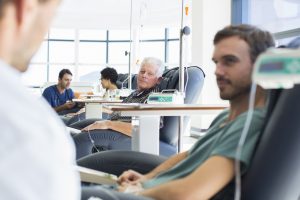Clinicians are now using laxatives to help patients get home sooner after undergoing bowel surgery at the Royal Adelaide Hospital.
The change in treatment is a result of findings from the STIMULAX trial, the biggest ever study of the use of laxatives after bowel cancer surgery.
Slow transit, slow return home
A common complication after colorectal surgery is a slow return to normal bowel function, which delays when patients can return home.
For colorectal surgeon and researcher at the Royal Adelaide Hospital, Associate Professor Tarik Sammour, improving patient recovery is guided by a simple mantra:
“The treatment doesn’t end when the abdomen is closed, it ends when the patient is home with their family and has a decent quality of life,” he said.
“And so, the sooner we can get patients to have normal bowel function after surgery, the sooner they can go home.”
A simple solution
In the STIMULAX trial, one group of patients received usual care and one group received a combination of laxatives which stimulate the nerves of the bowel and draw more water into it, speeding up bowel movement.
A/Prof Sammour and his colleagues found that in patients who take laxatives after bowel cancer surgery (who aren’t going to start vomiting), about 70% have their bowels work more quickly and as a result they go home sooner.
“As a result of this study, laxatives are now a routine part of post-operative care at the Royal Adelaide Hospital – with good outcomes for patients,” said A/Prof Sammour.
A world-first
The team has followed this up with another world-first study testing a novel drug to tackle the 30% of patients who are not responding to the laxative treatment (possibly due to lack of absorption if they’ve been vomiting.)
This large study, called the PYRICO trial, was recently completed with final
results expected to be available in the middle of this year.
“If this study shows positive results, it will likely change practice around the world and hopefully help the hundreds of thousands of patients that undergo bowel cancer surgery every year,” said A/Prof Sammour.



